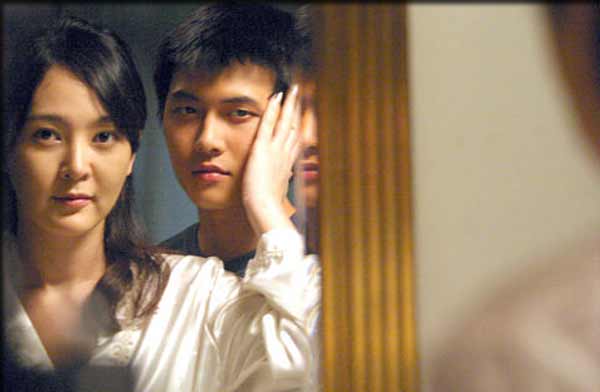Ten years ago, an offbeat indie effort like 3-Iron would have been the exclusive product of a thriving film market like Japan. Now, it's a testament to how far and how fast South Korea's diversity has grown.
Tae-suk (Jae Hee) has a job. He tapes takeout menus to doors throughout suburban Seoul. Then again, that could just be an excuse for his avocation. Later on, he returns to those dangling menus. If they've been left undisturbed, it's a clue that the owners of the house are not home, perhaps off on vacation. Tae-suk uses his lockpicking skills to break into those houses where he … well, basically moves in. You see, he isn't there to steal anything, exactly. He's simply there to cook up some dinner, wash his clothes and sack out for a night or two.
Very quickly, however, we get the impression that Tae-suk isn't just some homeless kid looking for a place to crash. He's clean, well-groomed and rides a very expensive BMW motorcycle. Perhaps Tai-suk gets some sort of voyeuristic satisfaction out of living in other people's houses–not that we would know that from watching him. His dry, expressionless face betrays no emotion, good or bad. But clearly, as he flips through family photos, waters the plants, takes pictures of himself on the premises and executes a few harmless pranks (rewiring bathroom scales, changing clocks) he gets something out of insinuating himself on other people's lives.
One night, Tae-suk breaks into a very upscale residence marked by one of his undisturbed flyers. Unbeknownst to Tae-suk, however, the house is not empty. It's currently occupied by Sun-hwa (Lee Seung-yeon), a beautiful young model who has been in a near-suicidal funk since giving the boot to her abusive husband. Rather than be outraged by this intruder, she's intrigued. Soon enough, she's ditched her posh digs and is accompanying Tae-suk on his nighttime raids.
Writer/director Kim Ki-duk (who gave us the mesmerizing Spring, Summer, Fall, Winter … and Spring) works some minor wonders here. For starters, neither of our protagonists says a word. Everything is carried out through body movement and facial expression. Not to worry: Some of the other characters have dialogue and there is a wealth of expressive background noise, so the film is never lacking for sound. For all of its quietude, 3-Iron speaks volumes.
The film spends much of its time as a sort of criminal lovers-on-the-run romance. It's like Bonnie and Clyde, if Bonnie and Clyde were mute, nonviolent and largely nonsexual. Eventually, the law catches up with our two taciturn protagonists and the jig is up. Sun-hwa is returned to her brutish husband and Tae-suk is whisked off to jail. Here, 3-Iron takes a stylistic turn, ending up in almost Zen-like magical realist territory. Rest assured, the film's ending is both beautifully odd and poetically brilliant.
For those who like clean closure, it must be noted that Kim doesn't give any easy answers as to what this film is really all about. Is it a commentary on disconnected modern romance? An examination of emotionally empty people in search of an ego? A plea for communication amid today's bifurcated families? Heck, those all work. The best bet here is to go in with few expectations. Let the film's dry wit, somber drama, lush romance and near-spirtual cinematography wash over you … and then discuss at length afterwards–perhaps over a plate of bulgogi at the nearest Korean restaurant.



